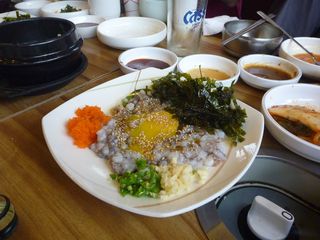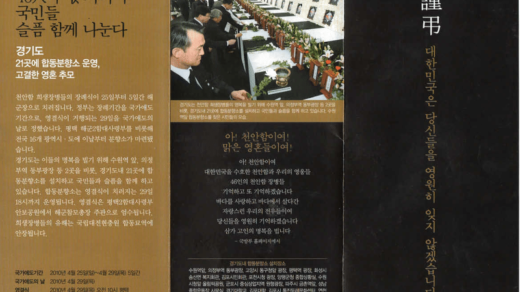It’s not unusual to hear non-Korean learners of Korean talk about the vagueness of the language and how Korean is inherently ambiguous. Many Koreans seem to have bought into this myth based on what they’ve heard from others. However, I completely disagree. Korean is a precise language where ambiguities can be eliminated if the speaker or writer wishes to do so and those who think otherwise are confusing cultural causes of ambiguity with linguistic ones.
“Would You Mind Passing Me the Raw Octopus?”
 I remember that when I first came to Korea and started learning the language, I was uncomfortable with the directness of Korean in certain situations until I’d reached a more advanced stage and figured out new ways of expressing myself.
I remember that when I first came to Korea and started learning the language, I was uncomfortable with the directness of Korean in certain situations until I’d reached a more advanced stage and figured out new ways of expressing myself.
For example, in English, we avoid being too direct when asking for something. Rather than saying, “Give me the raw octopus.” (or even, “Give me the raw octopus, please”), we generally soften it by saying, “Would you mind passing me the raw octopus?” In a literal sense, the correct answer is not to pass the octopus but to answer with a “yes” or “no”. Still, the intent is understood and we generally pass the octopus in this situation (as in the photo above. Realistically, of course, we’re not generally talking about raw octopi in English; for the original photoblog posting: “I Tried a New Raw Octopus Delicacy Today”.)
Korean has roughly comparable versions too: “Give me the raw octopus.” (“산낙지를 줘요.”), “Give me the raw octopus, please.” (“산낙지를 주세요.”; Adding “제발”, the dictionary translation of “please” completely misses the nuance and would only be used if begging.) But it’s hard to say that the softest version in Korean for asking for the raw octopus (“산낙지를 주시겠어요?”) is as roundabout as the English, “Would you mind passing me the food?”. Further, depending on the situation and usage, the very slight nuance difference between “산낙지를 주시겠어요?” and “산낙지를 주실래요?” can imply quite a bit of directness if one isn’t careful.
Korean is Much More Precise than English about Hierarchy
A case can be made that Korean is more precise in many ways, since the relative status of the speaker, listener and those being spoken about are all implied in the construction of sentences. When translating Korean back to English, except in extreme situations, I find myself stripping out most/all references to this hierarchy since to include all of this gets quite onerous:
“Lowly me asks that you esteemed one send lowly me information about your excellent company. Please also convey with respect my regards to the esteemed president of your excellent company.”…
Uh-huh… I should try that once in a translation and see what my client has to say about it…
Korean is a Great Language for Contracts, Scientific Papers, Patents and Engineering Specifications
Over the years, we’ve translated many different kinds of documents and the easiest projects are often the ones with the need to be most literal and precise. Once the cultural factors are removed, there’s nothing keeping the translator from just plowing through the text with as much exactness as possible. While word order may be completely turned upside down and inside out, the terminology is generally just a matter of looking up words in the dictionary.
In contrast, it’s the translation of stories, poetry and other literary works that presents the most challenges, not because of any lack of precision in the Korean language itself, but because of cultural factors that influence the expression of that Korean. Thus, any perceived or real ambiguity in Korean is due to cultural, not linguistic, factors.



